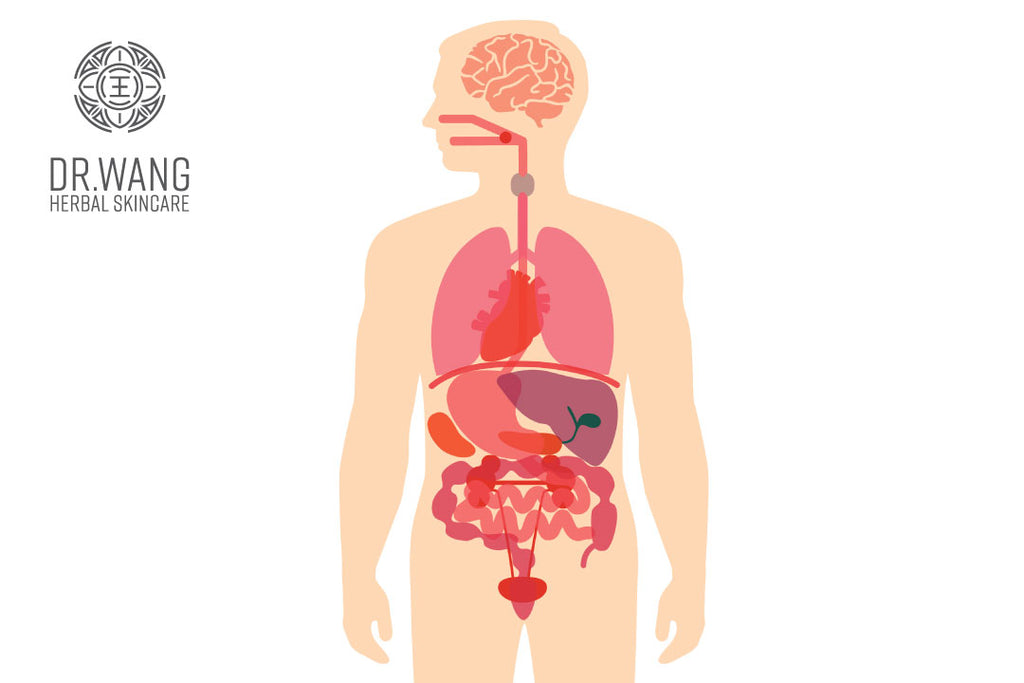Understanding the TCM Organ Systems (Zang Fu)
In Traditional Chinese Medicine a body isn’t looked at through individual parts, but rather as a whole entity. Organs aren’t really an anatomical feature, but rather part of a complex system that keeps the whole body running smoothly. In Traditional Chinese Medicine there is much more of an emphasis on how the organs interact with each other than there is in Western medicine.
This is known as the Zang Fu Organ System Theory and it is a fundamental concept for practitioners of Traditional Chinese Medicine.

What is the Zang-Fu Organ Theory?
There are five Zang organs and six Fu organs. The Zang organs include the heart, lungs, kidneys, liver, and spleen and the Fu organs include the gallbladder, large intestine, small intestine, urinary bladder, and the san jiao (or triple burner.) Think of it this way; the Zang organs are the superheroes (like Batman) and the Fu organs are their sidekicks (like Robin.) Zang fu organ theory is similar to the concept of Yin and Yang, in that everything is connected and meant to be equally balanced, and interconnected.
Liver
The first Zang organ we will review is the Liver. The Liver’s complimentary Fu organ is the Gallbladder. In TCM, the Liver is most impacted by emotions and stress. It is also for the flow of these emotions as well as Qi and blood. The eyes are also part of the Liver “system.” In Traditional Chinese Medicine it is believed that If you have any eye issues, including blurry vision, red or dry eyes, itchy eyes, it may be a sign that your Liver is not functioning properly.
Also the “sour” flavor is closely related to your Liver. So if you find yourself craving sour candy, for example, it may be a sign that your Liver is not in balance and needs to be recentered.

Heart
In Traditional Chinese Medicine the Heart is the center of all organs. So, when it comes to energy and balance, other organ systems will give up their energy in order to maintain balance in the Heart. The Heart’s complimentary Fu organ is the Small Intestine.
When you sweat (or perspire) it is being controlled by the Heart. Those who perspire excessively could have an imbalance in their Qi that needs to be corrected. The tongue is also part of the Heart’s organ system and will be a healthy red color when this organ is in balance. If you notice that your tongue is pale, this could indicate a fluid stagnation which means the Heart system is not in balance.
Just like sour taste was associated with the Liver, bitter taste is associated with the Heart. If you find yourself craving bitter foods, your Heart may be out of balance.
Stomach
Next up, the Stomach! The Stomach’s complimentary Fu organ is the Spleen and it is most impacted by chronic anxiety, or overthinking. In Traditional Chinese Medicine the Stomach is not only responsible for digesting food, but also for digesting your emotions! When you are constantly anxious or having negative thoughts you can really do a lot of damage to your Stomach so stress management is part of having good gut health.
Because they are part of the Stomach’s organ system, any issues like bleeding gums or bad breath are a sign that your Stomach is not balanced. Muscle tissue is also associated with the Stomach so if your muscles are sore and cramp easily, it can be a sign of Stomach or Spleen dysfunction.
The taste that corresponds with the Stomach is sweet. So if you have a sweet tooth, it could be a sign that your stomach needs support! Also reducing the amount of cold drinks you have can also support healthy Stomach function.

Lung
The Lungs and their complementary Fu organ, the Large Intestine, is the organ system we pay the most attention to as they are connected to the skin. If you are experiencing any skin conditions like acne or eczema, it is a result of an issue with the Lungs. The nose is also part of the Lungs organ system so any runny nose, sneezing, congested sinuses, loss of smell, are all symptoms of compromised Lung function.
The taste that corresponds to and supports the Lung is spicy!
Kidney
And finally we have the Kidney! The Kidney’s complimentary Fu organ is the Bladder. The Kidney’s function is to be a “reserve generator” of energy within the body, and supplying extra Qi to all the organs when needed.
The ears are part of the Kidney’s organ system so any condition that impacts these is a signal that your Kidneys need extra support. Bone tissue is also associated with the Kidneys so if there is an imbalance in energy, you may experience symptoms such as osteoporosis, dental issues, or developmental issues.
Craving salt? This is your Kidneys telling you that they are out of balance.
Bottomline
Dr. Wang Herbal Skincare is a family business started by Steven Wang, MD, and Gui Wang, LAc. Our co-founders have been working together for over two decades to offer holistic, innovative, and effective skincare products.
We are guided by three primary principles: formulate skincare products with proven efficacy to promote skin health, harness the power of Traditional Chinese Medicine (TCM), and utilize the latest modern medical breakthroughs.
To learn more, view our family of products or read what publications like The New York Times and Reader’s Digest have to say about Dr. Wang Herbal Skincare.




